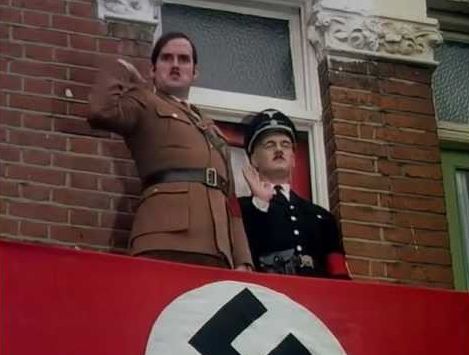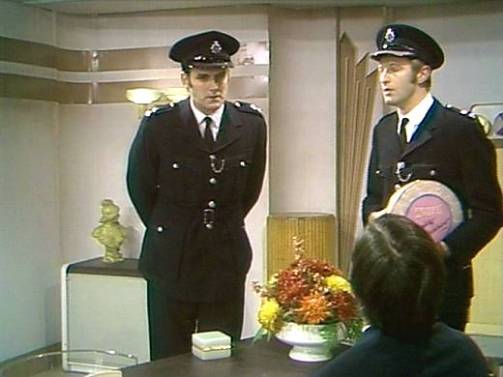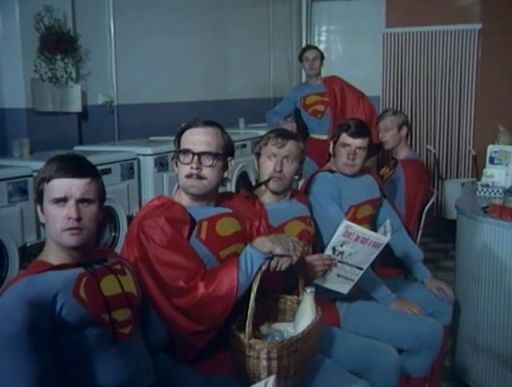
Background
Like its Rediffusion stablemate At Last The 1948 Show, Do Not Adjust Your Set was an important building block which paved the way for Monty Python’s Flying Circus. And despite its status as a children’s show, DNAYS quickly gathered an appreciative adult audience as well (John Cleese, for one, was especially captivated).
Running for two series – the first on Rediffusion, the second on Thames – DNAYS was the brainchild of Humphrey Barclay. Barclay was a Cambridge Footlights contemporary of John Cleese, Graham Chapman and Tim Brooke-Taylor and would continue to work with Cleese and Brooke-Taylor on the radio series I’m Sorry I’ll Read That Again.
Michael Palin and Terry Jones had first met as students in Oxford and continued their writing partnership following their graduation (joining a roster of very familiar names penning material for The Frost Report). They also worked as BBC writers for hire, with Billy Cotton and Roy Hudd amongst their clients. Although the pair had appeared on television prior to DNAYS, it was this series which allowed them to blossom as performers (something which Palin remains grateful for to this day).
Eric Idle, a Cambridge Footlights old boy, was (like seemingly everybody else in the comedy world during the mid sixties) a writer on The Frost Report and also co-wrote (along with Barry Cryer and Graham Chapman) the first series of the Ronnie Corbett sitcom No, That’s Me Over Here! (the series which replaced At Last The 1948 Show in the schedules).
Another future Python connection was put into place with the arrival of Terry Gilliam. His animations, similar in style to his Python work, would appear in some of the later episodes.
The roster of regulars was completed with Denise Coffey and David Jason. Both were hired as performers rather than performer/writers (as Palin, Jones and Idle were) but Coffey and Jason did eventually contribute material to the show. Captain Fantastic (a regular filmed insert featuring Jason as a bowler-hatted superhero and Coffey as his evil nemesis) was originally written by Palin, but he found it increasingly tough going (as he wasn’t performing the material) so Coffey and Jason took up the challenge. It proved to have a brief life outside of the series – the shorts continued for a short while as an insert in the magazine programme Magpie.

Regular musical interludes (and occasional sketch walk-on roles) came courtesty of The Bonzo Dog Doo-Dah Band, who are always nothing less than a total delight. Their antics are especially noteworthy when you consider that they had to fit these spots in-between their busy gigging schedule which regularly took them up and down the country. So that helps to explain why sometimes everything looks rather thrown together ….
Archive Status
Out of the 27 episodes made and broadcast, today 14 exist. The Thames series is especially hard hit – with only two (the 1968 Christmas special and episode two) now remaining from the thirteen broadcast.
There has been some positive news in recent years though. Episode four of series one was recovered back in 2015 (which does give one hope that more material might still be out there somewhere) whilst there’s nearly an hours worth of audio clips from selected missing Thames episodes on this DVD, which helps to fill in some of the gaps.
The Series
The first show should have been the Boxing Day special. Alas, due to a mix-up this wasn’t transmitted until January.
The Boxing Day theme might have been out of date by the time it was finally broadcast but there’s plenty of interest – Eric Idle as a slick quizmaster catches the eye as does the very lithe David Jason (in the boxing sketch). The Bonzo’s first contribution to the series is Jolitty Farm. It’s odd stuff, but when compared to some of their later offerings you have to say that it’s positively restrained ….
As with At Last The 1948 Show, it’s fascinating to see proto-Python moments pop up in DNAYS. The first show proper has an early outing for Michael Palin’s recalcitrant shop-keeper (today he’s annoying the unfortunate David Jason). Interesting to see the sketch play out to virtual silence – another early Python trait.
As the series progresses, a more adult and unconventional tone creeps in. This helps to explain why some sketches don’t get much of a reaction – at times the juvenile audience seems to be more comfortable with visual slapstick rather than intricate wordplay.
Travelling Kettle, How To Eat, Insurance Salesman and Art Gallery are all series one sketch highlights. The unexpected appearance of the keen-as-mustard Tim Brooke-Taylor (deputising for the ill Michael Palin) in episode nine is something else to look out for. And the increasingly demented Bonzos (blacked up when performing Look Out There’s A Monster Coming, playing football during Equestrian Statue) continue to be excellent value for money.
It’s a shame that so little material from the Thames era exists as what we do have is top notch (Palin and Jones continue to work excellently together). The audience sounds different in episode two (the laughter is deeper than the high-pitched chuckles from the first series, suggesting that the young audience has been supplanted by older types) and it would be interesting to know if this was a regular occurrence or just a one-off.
Picture Quality
Generally the episodes are in good shape – certainly overall the picture quality is more consistent and better than At Last The 1948 Show. Even episode four of series one, sourced from a Phillips 1500 cassette rather than a telerecording, is very watchable.
Special Features
Michael Palin (33 minutes) and Humphrey Barclay (34 minutes) both contribute new in-depth interviews whilst there are shorter contributions from Tim Brooke-Taylor and John Cleese. Three Terry Gilliam animations, remastered from his original 35mm elements, are another treat.
Pride of place on the extras disc has to go to the The Bonzo Dog Doo-Dah Band documentary. Running for sixty minutes and featuring contributions from Neil Innes, Rodney Slater, Roger Ruskin-Spear and ‘Legs’ Larry Smith it’s an absorbing watch.
Conclusion
Do Not Adjust Your Set obviously showcases Palin, Jones and Idle but this time round I’ve been especially impressed with David Jason, who throws himself into every sketch with gusto. Denise Coffey might have slightly less to do than the others (Palin, Jones and Idle have acknowledged that writing for women – unless they were actually playing them – was not their forte at this time) but having a regular female performer does add an extra dimension to the series.
As with At Last The 1948 Show, Do Not Adjust Your Set is an excellent package – the episodes bolstered by a plentiful helping of extras which help to set the programme firmly in context. The series’ hit rate was higher than I’d remembered from previous viewings and I’m sure that this is a DVD that I’ll come back to again and again in the future. Highly recommended.















